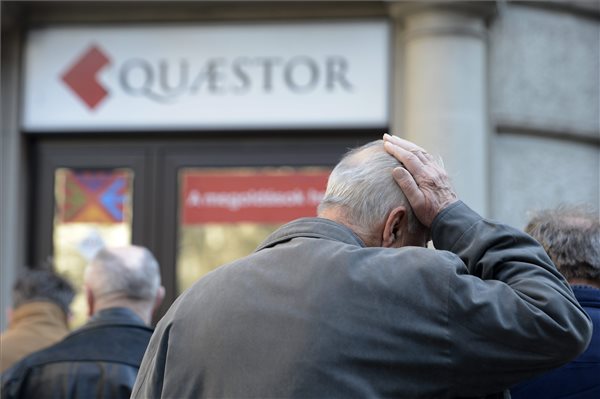Change language:
Government: Former head of Quaestor brokerage ‘common criminal’

Budapest, November 24 (MTI) – Csaba Tarsoly, the former head of the scandal-mired brokerage Quaestor in preliminary detention awaiting trial “is nothing other than a common criminal”, János Lázár, the government office chief said in reply to a question at a weekly news briefing on Thursday.
Commenting on an interview to the weekly Magyar Narancs in which Tarsoly criticised the central bank and Prime Minister Viktor Orbán for their alleged role in Quaestor’s demise — which left its clients short of money invested with the brokerage — Lázár said his impression left from reading the interview was that Tarsoly blamed everyone for the brokerage’s bankruptcy but himself.
“He would rather blame Jesus Christ for Quaestor’s bankruptcy instead of admitting to how many tens of billions of forints he stole,” Lázár said, adding that the accusations of a man who has been in jail for a long time were “empty”.
The National Bank of Hungary (NBH) on Thursday said it was filing a complaint to police against Tarsoly for libel and slander against the bank and its officials.
In a statement, the NBH rejected “false statements” it said Tarsoly had made in the Magyar Narancs interview. Tarsoly, who is currently in preliminary detention on charges of fraud and embezzlement in connection with Quaestor’s bankruptcy, maintained his innocence in the interview.
Tarsoly insisted comments made by the prime minister in one of his regular Friday morning radio interviews had triggered a run on the brokerage.
The central bank (NBH) said Tarsoly’s insistence that its investigation on March 9 last year had found no shortfall of clients’ assets was incorrect and the raid had revealed a shortfall of 150 billion forints of clients’ assets.
Tarsoly had claimed the decision to record minutes of a meeting last March with the central bank’s deputy governor, László Windisch, had been his own. The bank countered that it was Windisch who insisted on recording the meeting, which he handed to police investigators along with the findings of an on-spot raid of Questor’s headquarters which the NBH had carried out in its capacity as financial regulator.
The NBH noted that in the spring of 2015 it had uncovered a series of irregularities going back 15 years in the Quaestor, Buda-Cash and Hungaria brokerages. The bank said it then consistently cooperated with law enforcement and the courts in providing the information they needed to determine responsibility for the irregularities.
Quaestor failed last year after it was found to have sold some 150 billion forints (EUR 483m) worth of unsanctioned bonds.
The green opposition LMP party insisted that Tarsoly “could not have played his pyramid game” without “political protection”, and demanded that the Quaestor chief’s backers be identified. LMP group leader Erzsébet Schmuck suggested in a statement that the ruling Fidesz party was attempting to cover up Tarsoly’s “aiders and abetters in government circles”.
The leftist opposition Democratic Coalition (DK) accused the government of being “up its jugular” in organised crime and of using its power to “facilitate business between international criminals and those of Fidesz”. MP Agnes Vadai claimed “this government does business with criminals” and quoted Tarsoly as claiming that the foreign ministry had mediated between him and Ghaith Pharaon, a Saudi businessman accused of fraud and financing terrorism.
Jobbik said the cases of Tarsoly and Pharaon were “intertwined” and it called on the government to resign. In a statement, Jobbik insisted that the Pharaon-case was “the largest national security scandal of the past 25 years”. Links between Tarsoly and Pharaon had been established “under Fidesz’s auspices”, Jobbik said, insisting that several government members and the prime minister were implicated in the scandal.
Lázár dismissed rumours that the government had considered any kind of investment involving Pharaon. “I would recommend everyone drink some soothing tea; by and by a complete spy novel is unfolding,” Lázár said.
Photo: MTI
Source: MTI







